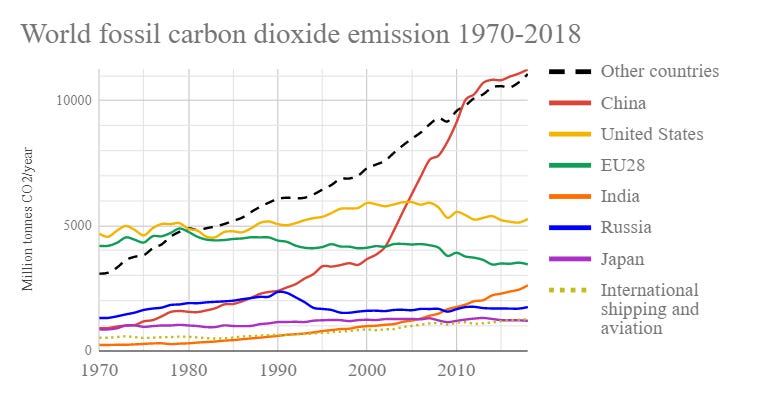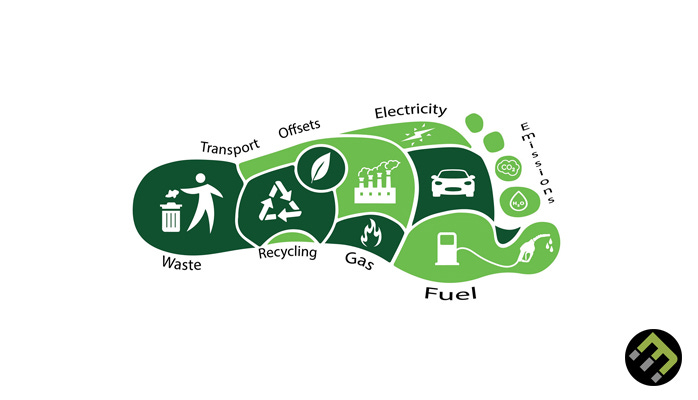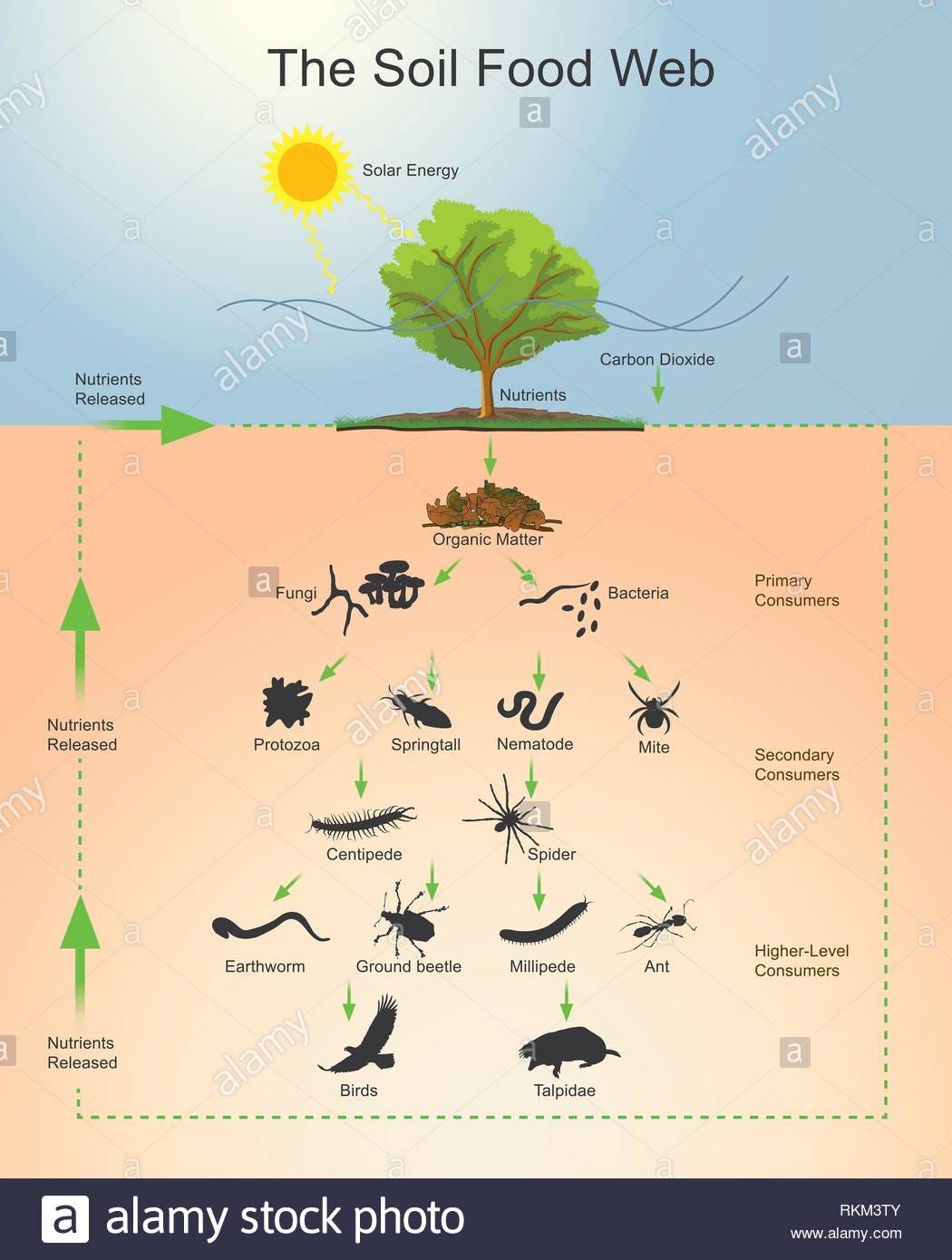Hey, turn off the lights while I dump oil into your ocean!
Talk about performative activism.
What even are carbon emissions, anyway?
Carbon (CO2) emissions refer to the high amounts of release of greenhouse gases into our atmosphere.
CO2, as you may remember from elementary school, is what we exhale during our normal breathing cycles. It’s what trees produce. In fact, the gas itself is naturally abundant in the environment.
The issue comes when we begin to overproduce it. It is the CO2 that comes from our planes, cars, boats, and buses that is sending our environment into turmoil. Explicitly, it is the biggest contributor to climate change.
You may have heard of the term “greenhouse effect”, which is used to describe the impact excessive CO2 has for our climate. Essentially, all of the extra CO2 acts as a greenhouse, slowly but surely warming our planet.
Greenhouse gases (CO2, methane, nitrous oxide, etc.) are not impacted by the sun’s radiation, but block infrared radiation from leaving the earth's atmosphere. This traps the sun’s radiation and warms the planet's surface. This is supposed to happen naturally. However, since concentrations of these gases are higher than were intended by nature, this process excessively warms our planet, contributing to climate change.
You may have also heard of the term “carbon footprint”. This refers to the total greenhouse gas emissions caused by an individual, based on transportation habits, food choices, and product consumption.
The term was promoted and popularized by British Petroleum (BP), a multinational oil and gas company headquartered in London, England.
“It’s time to go on a low-carbon diet,” read their website’s headline in 2006.
BP is categorized as one of the seven “supermajors”, otherwise known as Big Oil. The other six supermajors are Chevron, Eni, ExxonMobil, Royal Dutch Shell, Total, and ConocoPhillips.
These seven corporations hold incredible monetary and political influence in the oil and gas industry. In fact, prior to the Oil Embargo of 1973-4, they controlled about 85 percent of all
BP has been responsible for a plethora of environmental disasters, including the Deepwater Horizon oil spill in 2010. They have violated major federal environmental laws including the Clean Air Act, Clean Water Act, as well as several other laws designed to protect the environment and optimize public health.
So, for a corporation that is so ridden with environmental blame, you’re probably thinking it’s pretty hypocritical of them to insight shame on the consumer. You’d be right.
While yes, inherently there is nothing wrong with watching your electricity usage, limiting animal products in your diet, and taking public transport, it is not going to solve the climate crisis.
…but, something else could.
Carbon farming, reforestation, and ecosystem restoration in conjunction with the shift to 100 percent renewable energy have the capacity to stabilize our climate, limiting the Earth’s warming to 1.5 degrees Celsius above pre-industrial levels.
According to Climate in Crisis: Who's Causing It, Who’s Fighting It, and How Can We Reverse It Before It’s Too Late by Dick Russell, these efforts would translate to the drawing down of 286 billion tons of excess carbon from our atmosphere, and restoring them to their various sources: soil, forests, and landscapes. This could potentially reverse climate change, improve soil fertility, restore more predictable weather patterns, and replenish the nutrition in our food.
However, this is obviously somewhat idealistic.
According to The Food Fix by Dr. Mark Hyman, between 4.7 and 8.9 billion acres of our global farmland, pasture, and rangelands have been degraded. 70 percent of these were once healthy and prosperous spaces that cultivated highly successful crops.
As I mentioned last week, there are a few crops that disproportionately contribute to the exploitation within our food industry. These crops include soy, corn, and wheat, as well as meat production.
Every year, the farming industry makes about 52.91 billion dollars in corn revenue. 8 percent of that is used to make high fructose corn syrup, and a majority of the rest is used to feed factory-farmed animals, make oil, ethanol, alcohol, food additives, and processed-food additives.
However, corn is just one example. We yield many crops at nearly impossible rates, so to ensure adequate production, farmers use excessive chemicals and pesticides.
Today’s farming goes against the rhythms and patterns of nature. Indigenous farmers were able to work in conjunction with nature’s rhythms, rather than against them. However, farmers today do not diversify crop cultivation, and thus, deplete organic matter in soil.
Soil is a living system, complete with a plethora of diverse organisms that encourage plant growth, reuse nutrients from decomposing plants, provide our land with structure and water holding capacity, control diseases, and sequester carbon. When we deplete our soil, we deplete it of all of these capabilities.
Thus, restoring our soil is the key to restoring our climate.
The key to this is through a practice called regenerative agriculture: “An approach to farming and grazing practices helps rebuild organic soil matter, restore soil biodiversity, enhance carbon drawdown, and improve the water cycle by leveraging the power of photosynthesis and ecological harmony below and above ground.” (drhyman.com)
There are five primary recognized principles of regenerative agriculture: keep the soil covered, minimize soil disturbance, maximize crop diversity, maintain living root in the ground year-round, and integrate livestock. Essentially, these principles seek to bring farming practices back to the way they were prior to industrial intervention, rather than further degrading and over-utilizing our resources to yield maximum output.
Next week, I’ll be shifting gears a little bit and talking about environmental racism: how it has come to be, how existing policies exacerbate it, and what steps corporations need to take to minimize its effect on communities.
Until then, have a good week! I’ll “see” you all soon.
- Anja





